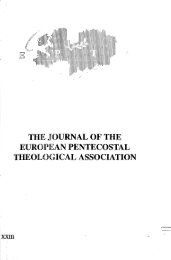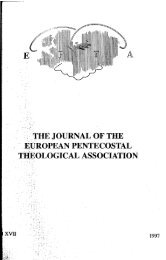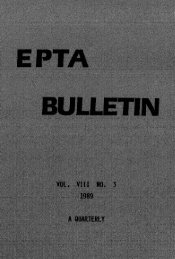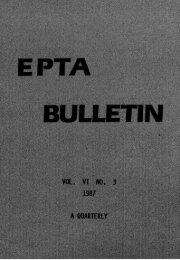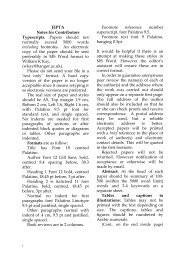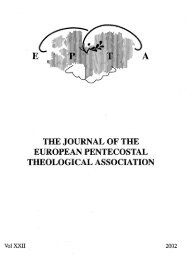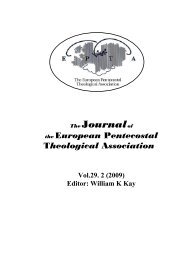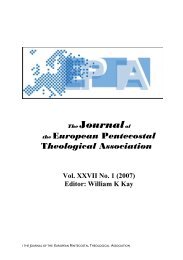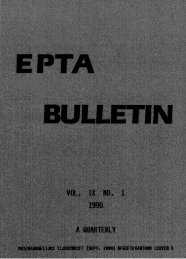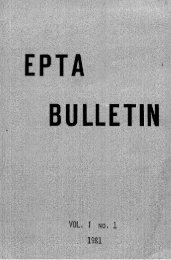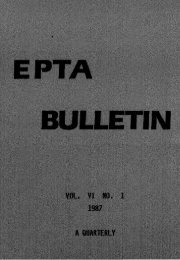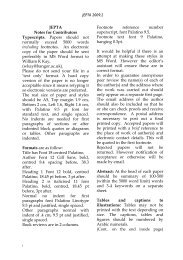jepta 2001 21 - European Pentecostal Theological Association
jepta 2001 21 - European Pentecostal Theological Association
jepta 2001 21 - European Pentecostal Theological Association
You also want an ePaper? Increase the reach of your titles
YUMPU automatically turns print PDFs into web optimized ePapers that Google loves.
The Journal of the <strong>European</strong> <strong>Pentecostal</strong> <strong>Theological</strong> <strong>Association</strong>, Vol. XXI, <strong>2001</strong><br />
The Earliest Days of British <strong>Pentecostal</strong>ism: Neil Hudson<br />
Henry Mogridge (1854- 1931 ) was another businessman who became a future<br />
<strong>Pentecostal</strong> leader. A class leader in the Methodist Church in Lytham,<br />
Lancashire, he had previously visited Sunderland during Barratt's stay in<br />
November 1907.' Fully committed to <strong>Pentecostal</strong>ism, he became an avid<br />
defender of <strong>Pentecostal</strong> doctrine and practice in his local newspaper.' His group<br />
met in a house whose partition walls had been removed to provide seating on the<br />
ground floor for 100 people, with room for 70 on the first floor. In 1914, within<br />
two years of the <strong>Pentecostal</strong> mission being in existence, they had grown to the<br />
extent that they had to move into a building seating 220 ~eople.' This hall was<br />
known as Elim, the name that George Jeffreys would later use to designate his<br />
new denomination.*<br />
Three others who were present, William Hutchinson, Frank Hodges and Andrew<br />
Turnbull, would become the basis for the Apostolic denominational stream within<br />
<strong>Pentecostal</strong>ism. In 1908, Hutchinson was at a personal cross-roads. Aged 44, he<br />
had been invalided out of the Boer war in 1902 after having served in the<br />
Grenadier Guards and had then worked as an inspector for the Society of the<br />
Prevention of Cruelty to Children in London. During this time he had<br />
worshipped in a Baptist church. By 1907, he had resigned from the Society,<br />
believing that he would be invited to lead evangelistic services by local churches.<br />
However, this did not happen and he had to be content to host small cottage<br />
meetings in his own home. He was invited to the Sunderland Convention and<br />
testified of having been healed of a heart condition and being baptised with the<br />
Spirit. The services provided the renewal for his faith that he had felt had been<br />
needed and he returned to Bournemouth to establish a church in Muscliffe Road,<br />
Winton which opened on 5 November 1908 as Ernmanuel Mission Hall. This<br />
was the first purpose-built <strong>Pentecostal</strong>- church in Britain. Although his ministry<br />
would quickly become sidelined from the mainstream of <strong>Pentecostal</strong>ism,<br />
Hutchinson was the leader of the first <strong>Pentecostal</strong> denomination, the Apostolic<br />
Faith Church.' Hodges, who testified of being healed of a heart condition<br />
established a small church in Hereford which would become part of the A.F.C.<br />
Andrew Turnbull would be drawn into the Apostolic Church in later years.<br />
The Scottish representation at the Convention, although small, would become<br />
very instrumental in the development of Scottish <strong>Pentecostal</strong> doctrine and<br />
practice. The Beruldsens came to Sunderland from Edinburgh. In years to come,<br />
I<br />
G. Weeks, Histoty of the Apostolic Church, Unpublished ms.<br />
For example, Lytham Times, 3 June 1910, 7 October 1910, 16 June 191 1, 18 April 1913, 16<br />
January 1914,27 March 1914.<br />
' 'Opening of Elim Gospel Mission', Lytham Times, 16 January 1914.<br />
' D. Cartwright, The Great Evangelists, Basingstoke: Marshall Pickering, 1986,45-46.<br />
Weeks.<br />
they would see their three children engaged in overseas <strong>Pentecostal</strong> missions.<br />
Eilel Beruldsen had been a Norwegian sea-captain before becoming a prosperous<br />
ship-chandler in Leith. Members of Charlotte Street Baptist Church, Edinburgh,<br />
on their return from Sunderland, they publicly testified to having received the<br />
Baptism in the Holy Spirit with the gift of tongues. It was the last activity they<br />
were allowed to perform in the Baptist church. Therefore, they set out to<br />
establish their own <strong>Pentecostal</strong> mission which became known as Bonnington<br />
Toll, becoming famous for being Donald Gee's first pastorate ' An 'unattractive<br />
low-roofed, double-fronted shop in the poorest part of Leith, converted into a<br />
mission hall,'' it found its place in a town 'overstocked with little Mission Halls<br />
of that type1.' Beruldsen was accustomed to employing workers and took the<br />
same attitude in his oversight of the Mission Hall. Gee remembered, 'Mr<br />
Beruldsen employed (the right word) workers to run the Mission for a salary. He<br />
had little discernment and soon tired of a new voice'.* Gee saw the Beruldsens as<br />
'typical of an era now passed. It consisted of semi-private little meetings often<br />
financed by devoted Christians with a zeal for God. They usually had strong but<br />
ill-directed missionary interests. The inescapable element of patronage between<br />
employers and employees where local pastors were concerned caused a chafing<br />
where men felt they were called by the ~ord.''<br />
John Martin came to Sunderland from Motherwell, along with John Miller of<br />
Glasgow, both of whom had been directly influenced by Andrew Murdoch from<br />
Kilsyth. Murdoch had received the gift of tongues after Hutchinson had prayed<br />
for him during their first visit to Sunderland. Murdoch subsequently prayed for<br />
Martin to be baptised in the Spirk6 Miller's wife had received the baptism at<br />
Murdoch's home in February 1908.' Miller then opened a <strong>Pentecostal</strong> 'upper<br />
room' which met in Water Street, a particularly needy part of the city.'<br />
Murdoch was one of the leaders of Westport Hall, Kilsyth. On 7 February 1908,<br />
the Kilsyth Chronicle reported that exactly one week previously, eleven people<br />
had spoken in tongues during a prayer meeting9 Westport Hall had been<br />
established in 1896 as the Kilsyth United Evangelistic <strong>Association</strong>, an initiative<br />
' D. Gee, Bonnington Toll. The Story of afirstpastorate, (London: Victory Press, 1943).<br />
' Ibid, 6.<br />
' D. Gee, These Men I knew, 18<br />
' lbid, 18.<br />
"bid, 19.<br />
Confidence, April 1908,12.<br />
' Confidence, September 1908,<strong>21</strong>0.<br />
' Confidence, November 1909, 255. Water Street had hosted a Faith Mission in 1885. There is<br />
no indication whether it was the same building. E. Govan, Spirit of Revival, 25.<br />
Quoted in J. Wiseman, 'Interpreting the Tongues: The Experience of the <strong>Pentecostal</strong> Baptism<br />
in the formative years of a Scoaish <strong>Pentecostal</strong> Assembly', MA thesis, Regents <strong>Theological</strong><br />
College, 1997.



